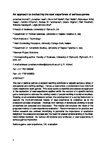An approach to evaluating the user experience of serious games
| dc.contributor.author | Moizer, Jonathan | |
| dc.contributor.author | Lean, Jonathan | |
| dc.contributor.author | Dell’Aquila, E | |
| dc.contributor.author | Walsh, P | |
| dc.contributor.author | Keary, AA | |
| dc.contributor.author | O'Byrne, D | |
| dc.contributor.author | Di Ferdinando, A | |
| dc.contributor.author | Miglino, O | |
| dc.contributor.author | Friedrich, R | |
| dc.contributor.author | Asperges, R | |
| dc.contributor.author | Sica, LS | |
| dc.date.accessioned | 2019-04-12T08:28:23Z | |
| dc.date.available | 2019-04-12T08:28:23Z | |
| dc.date.issued | 2019-07 | |
| dc.identifier.issn | 0360-1315 | |
| dc.identifier.issn | 1873-782X | |
| dc.identifier.uri | http://hdl.handle.net/10026.1/13702 | |
| dc.description.abstract |
The use of serious games to support learning continues to expand across a range of educational and training settings. Hence, a need exists to understand more fully how users experience such games. This study seeks to describe and assess an approach to the evaluation of user-experience applied within the context of a specific serious game developed to address the training needs of people working in social enterprises. Drawing on an extensive literature review, the development of a survey instrument to capture the multi-dimensional nature of user-experience is explained as is the evaluation process employed. Findings from surveys of individuals working in social enterprises are analysed and discussed. The results demonstrate the value of the proposed method of user-experience evaluation. Recommendations for practice and further research are outlined, identifying in particular the importance of qualitative insights in the evaluation process and the need for greater understanding of the inter-relationships between the various dimensions and attributes of user-experience in serious games. | |
| dc.format.extent | 141-151 | |
| dc.language | en | |
| dc.language.iso | en | |
| dc.publisher | Elsevier | |
| dc.subject | Serious game | |
| dc.subject | User experience | |
| dc.subject | UX | |
| dc.subject | Evaluation | |
| dc.title | An approach to evaluating the user experience of serious games | |
| dc.type | journal-article | |
| dc.type | Journal Article | |
| plymouth.author-url | https://www.webofscience.com/api/gateway?GWVersion=2&SrcApp=PARTNER_APP&SrcAuth=LinksAMR&KeyUT=WOS:000467892100011&DestLinkType=FullRecord&DestApp=ALL_WOS&UsrCustomerID=11bb513d99f797142bcfeffcc58ea008 | |
| plymouth.volume | 136 | |
| plymouth.publication-status | Published | |
| plymouth.journal | Computers and Education | |
| dc.identifier.doi | 10.1016/j.compedu.2019.04.006 | |
| plymouth.organisational-group | /Plymouth | |
| plymouth.organisational-group | /Plymouth/Faculty of Arts, Humanities and Business | |
| plymouth.organisational-group | /Plymouth/Faculty of Arts, Humanities and Business/Plymouth Business School | |
| plymouth.organisational-group | /Plymouth/REF 2021 Researchers by UoA | |
| plymouth.organisational-group | /Plymouth/REF 2021 Researchers by UoA/UoA17 Business and Management Studies | |
| plymouth.organisational-group | /Plymouth/Users by role | |
| plymouth.organisational-group | /Plymouth/Users by role/Academics | |
| dcterms.dateAccepted | 2019-04-06 | |
| dc.rights.embargodate | 2020-10-8 | |
| dc.identifier.eissn | 1873-782X | |
| dc.rights.embargoperiod | Not known | |
| rioxxterms.versionofrecord | 10.1016/j.compedu.2019.04.006 | |
| rioxxterms.licenseref.uri | http://www.rioxx.net/licenses/all-rights-reserved | |
| rioxxterms.licenseref.startdate | 2019-07 | |
| rioxxterms.type | Journal Article/Review |


